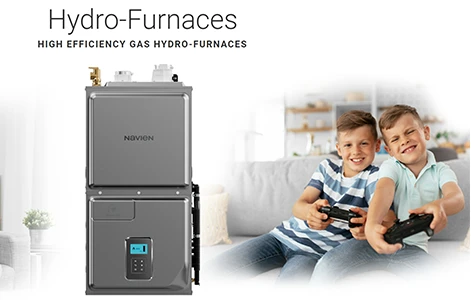The operating cost of a heating system depends on several factors, including the rated efficiency of the system, the cost of fuel or electricity, and the climate in which it operates.
When considering different heating systems, such as furnaces, boilers, pellet stoves, and heat pumps, which has the lowest operating cost? In general, heat pumps tend to have the lowest operating cost among heating systems. Heat pumps are highly efficient because they move heat rather than generate it, which means they use less energy to produce heat. Additionally, the cost of electricity, which is the primary energy source for heat pumps, tends to be lower than the cost of other fuels, such as oil or propane. The efficiency of a heat pump decreases as the outside air gets colder. During the warmer shoulder months (Spring and Fall) heat pumps can have a COP (Coefficient of Performance) of 4 or greater. Even when outside temperatures dip into the single digits, heat pumps can operate with a COP of 2, while the most efficient furnaces and boilers only have a COP of .97.
Heating your home is a major expense during the winter months, and it's important to choose the most cost-effective and efficient method for your needs. Two popular options are an oil furnace and an air source heat pump. In this article, we will compare the efficiency and cost per million BTUs of these two heating systems.
As the winter season approaches, homeowners may be considering their heating options and weighing the pros and cons of different systems. Two common heating options are propane furnaces and boilers, and air source heat pumps. In this article, we'll compare the efficiency and operating costs of these systems.
When it comes to choosing a heating system for your home, one of the biggest decisions you'll face is whether to go with a boiler connected indirect water heater or a tankless coil. While tankless coil boilers are often considered contractor-grade, they still have their benefits, and understanding the differences between the two can help you make an informed decision.
Propane regulators are critical components of a propane gas system that regulate the pressure of propane gas flowing from the propane tank to the appliances. A faulty regulator can cause problems with your propane gas system, such as low gas pressure, poor appliance performance, and even gas leaks. It is important to know the signs of a bad propane regulator so that you can address the issue promptly and avoid any safety hazards.

A.J. LeBlanc Heating is excited to offer the latest in home heating technology with the installation of Navien's new NPF hydronic furnace. This state-of-the-art system is designed to provide superior efficiency and comfort for modern homes.
Advanced Technology for Optimal Performance
The Navien NPF hydronic furnace integrates advanced features that set it apart from traditional heating systems. Its high-efficiency condensing technology ensures maximum heat output with minimal energy consumption, significantly reducing utility bills. This eco-friendly approach aligns with growing demands for sustainable home heating solutions.
For decades, hydronic heating has been a trusted solution for keeping New England homes warm through long winters. Boilers have always been at the heart of this system, circulating hot water to radiators, baseboards, or radiant floors. Now, a new wave of technology is reshaping how we think about boilers and energy efficiency: the heat pump boiler.
